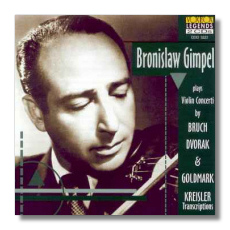
The Internet's Premier Classical Music Source
Related Links
-
Bruch Reviews
Dvořák Reviews - Latest Reviews
- More Reviews
-
By Composer
-
Collections
DVD & Blu-ray
Books
Concert Reviews
Articles/Interviews
Software
Audio
Search Amazon
Recommended Links
Site News
 CD Review
CD Review
Bronislaw Gimpel Plays

- Max Bruch: Violin Concerto #1 in G minor, Op. 26
- Antonín Dvořák: Violin Concerto in A minor, Op. 53
- Karl Goldmark: Violin Concerto in A minor, Op. 28
- Fritz Kreisler Transcriptions: *
- Tartini: Fugue in A Major
- La Gitana
- Liebesfreud
- Liebesleid
- Schön Rosmarin
- Polichinelle - Serenade
- Rimsky-Korsakov: Arab Song from Schéhérazade
- Prélude and Allegro (In the Style of Gaetano Pugnani)
- La Précieuse (In the Style of Louis Couperin)
- Caprice Viennois
- Tambourin Chinois
- Rachmaninoff: Marguerite (Albumblatt)
- Falla: Danse Espagñole
Bronislaw Gimpel, violin
Southwest German Radio Orchestra/Rolf Reinhardt
* Pro Musica Orchestra, Stuttgart/Curt Cremer, arranger and conductor
VoxBox Legends CDX2-5523 1996 ADD 2CDs 70:22; 62:03
Here's a tribute to Bronislaw Gimpel, who died in 1979, that smacks too much of the kind of inadequate tribute he received in his own lifetime. This VOXBOX Legend isn't even mentioned in the notes to the recording (which are devoted to the composers and works). He was eminently worthy of mention. A headstrong young virtuoso, he got himself crosswise with Carl Flesch after one year of study. Flesch recommended an orchestral post, and Gimpel wound up in concertmaster positions for most of his career, in addition to a stint teaching at the University of Connecticut. It's too bad that he was run over by the juggernaut of popular violinists during the 50s and 60s. Listening to him here, he was the equal of the best - and the superior of everyone else. It's not just the blazing virtuosity; everyone nowadays has a formidable technical command, if not one quite equal to his. Gimpel also had a grand conception of the major concertos that almost no one has inherited today. It is no small tribute to his probing musicianship that his performance of the Goldmark concerto is in every way equal in nobility to Milstein's, and that was arguably Milstein's best recording! His Dvořák concerto may be the best available.
What made Gimpel a great violinist? He had a powerful bow arm, capable of the subtlest nuances. No one had a more commanding tonal presence than Gimpel projects in these recordings. He also had a lightning left hand, with a supple and expressive vibrato. His double stops were as formidable as a pair of Samurai swords perfectly synchronized. But he used his daunting technical apparatus to make complex passages sing. The Goldmark's first movement is slower than Milstein's, but you will notice the tempo only in the orchestral introduction. Once Gimpel enters, everything seems perfectly natural and inevitable. Incidentally, Gimpel's cuts in the Goldmark concerto are perhaps the most drastic that have been made in a recording. They are nevertheless rendered almost acceptable by Gimpel's warm championship of the solo part.
Dvořák's concerto has never been popular, but Gimpel makes as strong a case as possible for its rich lyricism and Slavic ardor. And not only in the slow movement: the first movement soars as never before and the finale dances - Gimpel's quicksilver left hand and sprightly off-the-string bowing move this sprawling and cumbersome finale expeditiously to its conclusion.
Gimpel's authority in the Bruch concerto is absolute. He attacks the quasi-recitatives with the assurance of a diva and the the razor sharpness of a fencer. His warmth in the slow movement is matched perhaps only by Stern's, while the finale is by turns sonorous and soaring.
Kreisler himself played many of his short pieces in transcriptions for violin and orchestra, so it's no insult to the master to arrange his work. The generous selection of pieces in this program includes several that are less frequently performed, such as the Tartini Fugue in A and Rimsky-Korsakov's Arab Song from Schéhérazade, as well as many favorites. Gimpel plays them with incisive virtuosity moderated by just the right amount of tenderness and teasing. The orchestral accompaniments, though stylistically intrusive at times, never overshadow his brilliance.
These recordings were made in the 1950s: the Bruch and Goldmark in 1956 and the Dvořák and Kreisler in 1957 (the Bruch and Kreisler works have never before been released). But the sound hardly shows its age. The accompaniments are transparent and detailed enough to satisfy the audiophile and skillfully enough wrought to satisfy demanding musical tastes.
By releasing these performances, Vox has paid tribute to the power of great violin playing - just as they did in their collection of concertos by Ivry Gitlis. In this era when everyone sounds alike but it doesn't matter because nobody has anything to say anyway, it is both refreshing and sadly nostalgic to listen to Gimpel. This kind of violin playing is not likely to come around again during our lifetimes. So listen and rejoice or weep, as you see fit.
Copyright © 1996, Robert Maxham


















